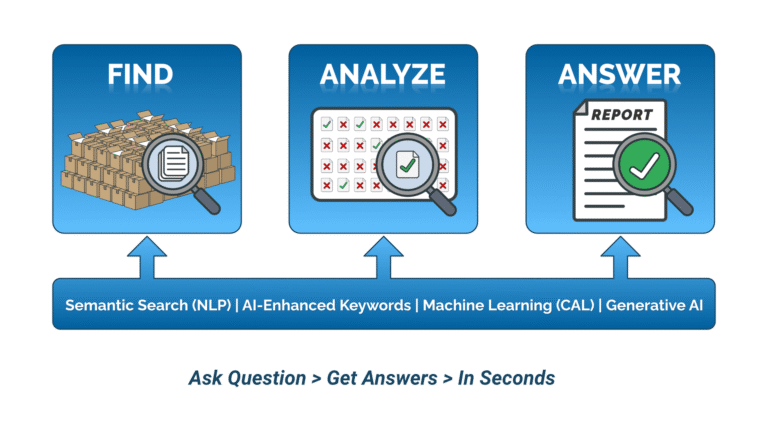By John Tredennick
Merlin’s Alchemy Interactive Framework represents a fundamental shift: from passive searching to active collaboration with AI. Instead of reviewing search hits, professionals can now ask questions and get answers.
At the heart of this shift is a simple, intuitive triad:
- Find – rapidly locate relevant documents in vast data sets.
- Analyze – let AI models review, classify and synthesize the information that has been found, surfacing insights and patterns.
- Answer – synthesize across documents to deliver clear, defensible reports.
The framework is interactive, meaning users are no longer trapped in a linear “search and review” cycle. Instead, they work alongside AI—refining questions, exploring results, and iterating quickly. It is discovery transformed into intelligence.
Step One: Find
The first step addresses the most basic pain point: the inadequacy of keyword search. Boolean logic has been the industry’s crutch for decades, but it cannot capture nuance, context, or evolving legal questions.
Alchemy replaces this with a triad of AI-powered algorithms:
- Semantic Search (NLP): Understands intent and meaning, not just literal words.
- AI-Enhanced Keyword Search: Expands and maps terms intelligently, reducing the risk of missing synonyms or related concepts.
- Machine Learning (CAL heritage): Continuously improves with feedback, surfacing more of what matters and less of what doesn’t.
The result is a search process that is smarter, faster, and more defensible. Lawyers can type a plain-language question like this relating to the BP Oil Spill disaster:
“I need to analyze all technical testimony regarding the well flow indicators that were present before the Macondo well blowout, including data from monitoring systems, observed anomalies, and then identify all explanations given for why these signals were not adequately recognized or acted upon.”
In seconds, Alchemy’s three types of AI-powered search work together seamlessly finding the 200+ most relevant documents or transcript sections likely to contain information to answer this question. For our part, we haven’t had to expend any efforts on building and testing a complex boolean query.
What once took days of refining keyword strings can now be accomplished in seconds.
Step Two: Analyze
Finding documents is only the beginning. In traditional workflows, this is where armies of reviewers would dig in, plowing through files page by page. That process is slow, costly, and inconsistent.
Alchemy automates this stage through Generative AI-powered document intelligence. Models can:
- Perform rapid first-pass reviews to determine relevance.
- Extract key facts, entities, and relationships from documents.
- Recognize patterns across hundreds of thousands of pages.
- Generate clear, context-aware summaries that preserve legal nuance.
Different AI models are applied strategically. Lightweight models such as Haiku 3.5 or GPT 5 mini can quickly review and assess hundreds of documents for relevance, reading, summarizing and scoring for relevance. What once took days of manual review can now happen in minutes.
For example, here is start of a summary of a highly ranked document prepared by Haiku 3.5:

